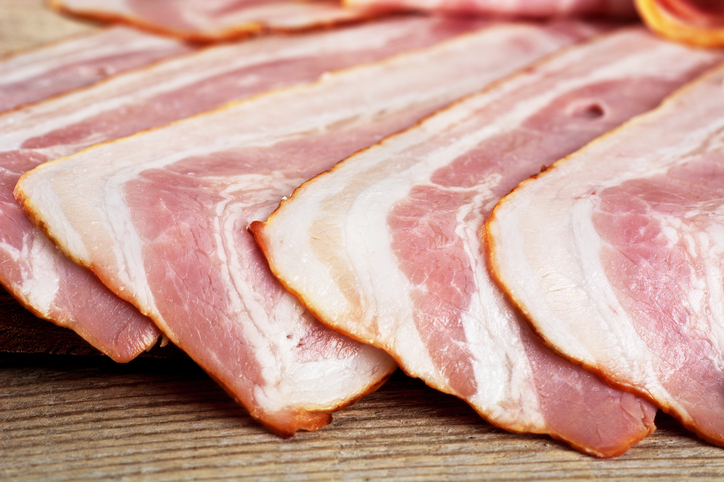 It used to be primarily Muslims refraining from eating pork, but nowadays people outside the Nation are starting to cut out 'swine' from their diets. Is pork bad for you? You see so many perspectives on the “other white meat," but what’s the truth on this highly controversial animal? It’s hard not to grab a BLT when you’ve seen your great grandparents chomping down on them for decades and lived to tell. But you also see the unhealthy flip side to eating pork and it makes you wonder, “is it really worth a trip to the doctor for?”
It used to be primarily Muslims refraining from eating pork, but nowadays people outside the Nation are starting to cut out 'swine' from their diets. Is pork bad for you? You see so many perspectives on the “other white meat," but what’s the truth on this highly controversial animal? It’s hard not to grab a BLT when you’ve seen your great grandparents chomping down on them for decades and lived to tell. But you also see the unhealthy flip side to eating pork and it makes you wonder, “is it really worth a trip to the doctor for?”
Dr. Helen Jackson, chair of the National Organization of Blacks in Dietetics and Nutrition said, “A low-fat diet can and should include lean protein sources like lean pork. Pork is an excellent source of B-vitamins, iron and zinc. Compared to many other meats and poultry, lean pork cuts – such as pork tenderloin or pork chops – have less fat and cholesterol and fewer calories."
BlackDoctor.org reached out to two experts to weigh in on this debate and find an answer to the question- "is pork bad for you?". Dr. Cedrek McFadden is a clinical assistant professor at the University of South Carolina School of Medicine Greenville and colorectal surgeon. Dr. Kimberly Jean is a board-certified physician and Founder/Medical Director of an integrative women’s health practice, Revita Juve.
BlackDoctor.org: Are there any advantages to eating pork?
Dr. McFadden: From a purely nutritional standpoint, pork has several advantages as a food source in the diet. High amounts of protein and B1 vitamins also known as thiamine, which is essential in the body’s metabolism of carbohydrates and amino acids are found in pork.
BlackDoctor.org: What are the disadvantages of eating pork?
Dr. McFadden: It’s high in saturated fat and cholesterol. It has been demonstrated, furthermore, that diets high in fat and red meats were associated with higher risks of colorectal cancer. As it relates to increasing the blood pressure, 3 oz. freshly cooked pork has about 60 mg of sodium (compared to 55 mg for the same quantity of cooked beef or even 50 mg in chicken drumstick). Additionally, even though sodium is naturally found in these foods, additional amounts are often added in the processing and preservation of the foods.
BlackDoctor.org: There is a common belief that pork has worms crawling around in it naturally. What are your thoughts on this?
Dr. McFadden: Many have concerns regarding the “cleanliness” of pork with thoughts of parasitic diseases such as trichinellosis or cystericercosis (parasitic infections from roundworms from which pigs are the most important source for humans) coming to mind. These infections are primarily present, however, when the pork is either consumed raw or when undercooked.
BlackDoctor.org: Is there any “acceptable amount” of pork that you should consume?
Dr. McFadden: Excluding religious and cultural restrictions of pork, when consumed in small portions within an overall balanced diet, pork is not "bad for you" and can be a reasonable component to the diet.
The USDA recommends that we get 56 g (for adult men) and 46 grams (for adult women) of protein every day. Ideally, that should be from a variety of sources low in saturated fats like beans, nuts, vegetables, and even meats. This includes lean (with the fat cut off) center cuts of meat, so like pork tenderloin. In one 3 oz. serving of meat, one could ideally consume approximately 20 g of protein.
BlackDoctor.org: What would you say to the person whose grown up thinking that pork is bad? A lot of people have been skeptical of the other white meat for quite some time.
Dr. McFadden: Those that were our primary care givers largely influence our views on religion, exercise, or even the way we eat. As we get older, we balance those influences with our own budding personal experiences. So, just because you grew up being skeptical of the “other white meat,” does not mean that you could not begin to incorporate small or modest amounts of pork into the diet.
BlackDoctor.org: Are there any types of pork that are healthier than others (bacon, ribs,pork chops, etc.)?
Dr. McFadden: Ribs tend to have higher amounts of saturated fats. Ham could be trimmed to be considered lean; but like bacon and sausages, ham tends to be more processed with resulting higher amounts of sodium that could raise the blood pressure.
Dr. Kimberly Jean offers a spiritual but medically sound approach to consuming pork.
Dr. Jean: The practice and specific instruction to refrain from eating pork dates back to the Bible. Many people are surprised by this but God told us that pork is unclean and not for human consumption (see Leviticus 11:7-8).
Think about it, pigs engage in coprophagia (consumption of feces) and waste removal. There is no limit to the kind of waste they eliminate on the farm. Because of this, pigs become saturated with toxins. The toxins accumulate in their organs, skin, fatty tissue, and other body tissue. Just knowing the diet that pigs eat should be enough to make anyone stop eating pork cold turkey.
Dr. Jean offers her top three reasons why consuming pork is unhealthy:
1. "As modern medicine continues to develop, we are finding out more about toxins that are affecting our current health. Pigs digest their meals in 4 hours, not giving their digestive system enough time to excrete toxins. Pigs also have very few sweat glands. Sweating is a form of detoxification. Without the ability to sweat, the toxins remain in in the body, especially in the fatty tissue."
2. "Bacon, ham, sausage, and other pork-derived foods are considered processed meats. The International Agency for Research on Cancer (IARC) has classified processed meat as a carcinogen, something that causes cancer. In short, pork-derived foods can cause cancer."
3. "Pigs do not live in the best environmental conditions. Crowded and dirty housing breed infection. Pigs are constantly infected with viruses and parasites that can be extremely hard to kill. Remember the outbreak with Swine Flu?"
Where do YOU stand on the debate?









